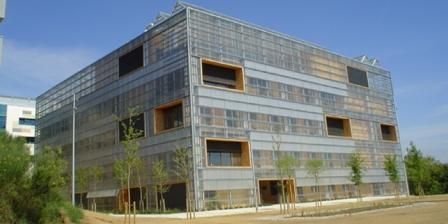
14/10/2014
UAB Inaugurates ICTA-ICP Building
UAB Inaugurates ICTA-ICP Building
The new main offices of the Institute of Environmental Science and Technology (ICTA) and the Institut Català de Paleontologia Miquel Crusafont (ICP) were inaugurated on October 10 at the Universitat Autònoma de Barcelona (UAB) the Barcelona Synchrotron Park works with.
The new building, unique thanks to the sustainability criteria with which it was constructed, controls its temperature through a bioclimatic “outer skin”, reducing energy consumption levels up to 62% and water consumption up to 90% in comparison to conventional buildings: the building achieved a LEED GOLD certification by the US Green Building Council.
With 206 and 55 employees respectively, both ICTA and ICP are world-class research centers that have now with these new shared main offices a new tool at their disposal to work better.
News based on the press released issued by the UAB.
Image: www.ovingenieria.es
The new building, unique thanks to the sustainability criteria with which it was constructed, controls its temperature through a bioclimatic “outer skin”, reducing energy consumption levels up to 62% and water consumption up to 90% in comparison to conventional buildings: the building achieved a LEED GOLD certification by the US Green Building Council.
With 206 and 55 employees respectively, both ICTA and ICP are world-class research centers that have now with these new shared main offices a new tool at their disposal to work better.
News based on the press released issued by the UAB.
Image: www.ovingenieria.es
More news
14/12/2018
The Open Innovation Forum matches business challenges to academic solutions
07/12/2018
2017 BioCat report: The best of the Bioregion of Catalonia
30/11/2018
Barcelona Synchrotron Park’s Commitment to Sustainable Growth
23/11/2018
Astronomers led by IEEC reveal a cold super-Earth around Barnard’s star
16/11/2018
CRAG’s Researchers discover how to generate plants with enhanced drought resistance
08/11/2018
The Barcelona manifesto: for a city-led science and technology diplomacy









